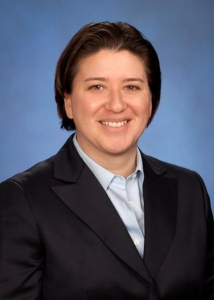 By Melissa J. Anderson (New York City)
By Melissa J. Anderson (New York City)
One key element in career advancement, according to Toni Mohammed, Client Manager at Marsh Inc., is being assertive about your goals. “I would advise young women to not be afraid to ask for what you want, work hard, keep pushing, and be patient.”
The other, she said, is building relationships. “This industry has a lot to offer. It’s also a very small world, so leveraging your networks early on will help you get to where you want to be.”
“I like to say I’m a child of insurance,” she said with a laugh, explaining that her mother worked in the industry for 25 years in Trinidad. “I kind of grew up in the industry.”
Born and raised in Trinidad and Tobago, Mohammed came to the United States on a scholarship, and went on to study math and actuarial science at Howard University. After completing actuarial internships at CIGNA, Nationwide, and Deloitte, she realized she wanted more client interaction, and took a position as an insurance broker at Marsh in Washington DC. As part of the firm’s Risk Analyst program, she developed a keen interest in Multinational, and within months of attending training in Atlanta, Georgia, she started working for the Multinational Client Practice as an International Property and Casualty broker.
Now Mohammed is a team leader and Multinational Advisor at Marsh, and co-leader of Pride@Marsh (the company’s LGBT affinity group). Mohammed has also become a sort of Middle East insurance expert. She recounts one of her proudest achievements as her work in this area.
“One of my defense clients had an auto fleet in Afghanistan, Iraq, Lebanon and other Middle East countries where certain local coverages were contractually needed. You can imagine in this economy it was a great challenge getting insurers to even offer these coverages, much less consider the aggregation risk concerns and cost,” she explained. “Fortunately with the expansive Marsh network and partners in London and the Middle East, I was able to find a solution for our client.”
“But I really have two jobs,” she continued. “My day job and my ‘gay’ job.”
“My day job of advising clients on what’s going on with international insurance and trends that can affect them is very exciting. Sharing knowledge with my teams and being part of a dynamic environment means that I’m always on my toes to see what works, how to improve, and how to change,” she explained.
“Balancing compliance with international regulations and cost analysis for international insurance programs are of key interest to me. With increased global scrutiny and the poor economy, there is greater tax activity by local governments when there is non-compliance with the insurance regulations. In some instances there are also hefty fines and penalties, including imprisonment, that our clients may be exposed to, so helping to explain international insurance regulations is key.”
“In my ‘gay’ job,” she continued, “we are also on the verge of change. With my co-leader Cris Castillo-Brizard, we have re-energized the LGBT group at Marsh called Pride@Marsh. We are getting involved in community and education. We are creating ties to business in ways that have never been done before. I am very proud the Marsh leadership is behind us and continues to do the right thing.”
 By Melissa J. Anderson (New York City)
By Melissa J. Anderson (New York City)
 By Melissa J. Anderson (New York City)
By Melissa J. Anderson (New York City) By Melissa J. Anderson (New York City)
By Melissa J. Anderson (New York City) By Melissa J. Anderson (New York City)
By Melissa J. Anderson (New York City)
 By Melissa J. Anderson (New York City)
By Melissa J. Anderson (New York City) By Melissa J. Anderson (New York City)
By Melissa J. Anderson (New York City) By Melissa J. Anderson (New York City)
By Melissa J. Anderson (New York City) By Nicki Gilmour, Founder and CEO of The Glass Hammer and Evolved Employer
By Nicki Gilmour, Founder and CEO of The Glass Hammer and Evolved Employer Contributed by
Contributed by